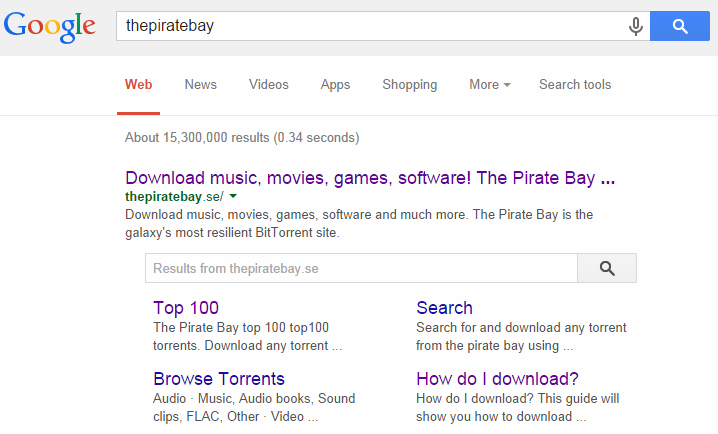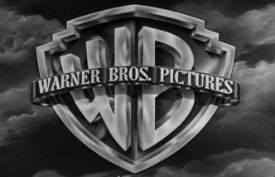Torrentfreak: “Google Adds Custom Pirate Bay Search With Autocomplete” plus 1 more |
| Google Adds Custom Pirate Bay Search With Autocomplete Posted: 08 Oct 2014 03:38 AM PDT
According to the RIAA, MPAA and others, Google is making it too easy for its users to find pirated content. Instead, they would prefer Google to remove sites such as the Pirate Bay from its search results. Thus far this hasn’t happened and it’s unlikely that the position will change in the near future. The search engine has changed Pirate Bay’s appearance in the search results, however, but not in the direction the copyright holders had hoped for. A few weeks ago Google announced its new and improved “sitelinks” section. This section also appears when searching for Pirate Bay related keywords and lists links to popular sections of the site. In an additional new move, it now shows a prominent search box that people can use to search for content on The Pirate Bay directly from Google.  The feature also works with other large search related sites and wasn’t intended for The Pirate Bay specifically. However, considering the entertainment industries’ previous critique this will soon be added to their long list of complaints. Perhaps even more painful than the search box itself is the fact that the new sitelinks also support AutoComplete. This means that people get pirate-themed search suggestions if they use the box in question. Simply typing in the letter G shows the following search suggestions, for example.  It’s unclear where these suggested terms are sourced from. They could come from popular searches on Google that relate to The Pirate Bay, or perhaps they are based on Pirate Bay pages that are indexed by the search engine. It’s worth noting that the “pirate” AutoComplete appears to go against Google’s policy of not showing copyright-infringing suggestions. Regular Google searches don’t suggest “Pirate Bay” when entering “Pirate B” for example. And things could get even worse in the future. For now, the custom Pirate Bay search box returns its results within Google. However, if The Pirate Bay decides to implement the right markup it will take users directly to The Pirate Bay, which is likely to escalate the situation further. The Pirate Bay team is aware of Google’s new feature and is considering adding support for these direct searches. Whether Google will allow that to happen remains to be seen. Source: TorrentFreak, for the latest info on copyright, file-sharing and anonymous VPN services. |
| Revealed: Warner Bros. Uses “Sophisticated Robots” to Fight Piracy Posted: 07 Oct 2014 08:57 AM PDT
As part of their $80 million settlement agreement with the movie studios, the file-hosting service also let the counter-suit over Warner Bros. alleged DMCA-abuse go. This meant that the true workings of Warner Bros. takedown systems remained secret, since many of the court filings were heavily redacted. Arguing that the public has the right to know how Warner operated, the Electronic Frontier Foundation therefore asked the court to unseal the records. Warner Bros. objected to this request, arguing that the effectiveness of their anti-piracy technology would be undermined by a public disclosure. However, two weeks ago U.S. District Judge Kathleen Williams ordered that it’s in the public interest to unseal the information. The first set of unredacted documents were published by Warner Bros. yesterday evening. While it’s only a fraction of all sealed material, we can now see what the movie studio was so eager to keep out of the public eye. Most of the unsealed information deals with Warner’s automated DMCA takedown tools. In the court filings these are described as “robots” which are programmed to mimic human behavior. “Warner uses a system of computer programs known as ‘robots’ to help search link sites. for links to infringing copies of its content. These programmable robots are highly sophisticated and can effectively mimic the search a human would conduct, except faster,” Warner explains.  This isn’t a big surprise, but Warner clearly preferred to keep its automated takedown tools out of the public domain. The unsealed information further shows that the script in question searches 200 hand-picked link sites for specific keywords. A takedown notice then goes out to the source site of this link. The actual content was never downloaded and reviewed, nor were the titles checked to see if Warner actually owned the content in question. “Its search process relied on computer automation to execute programs and did not involve human review of the file titles, page names or other overt characteristics before issuing a takedown notice,” an unredacted court order reads. “And because the files were not reviewed, neither Warner’s robots nor its employees made a determination whether there were legal uses for the files.” Despite revealing details of its “robots”, Warner still redacts how many employees its anti-piracy division employs. Unfortunately for them they forgot to black out one reference. According to an unredacted court order Warner employed seven people in its anti-piracy division at the time. All in all it appears that most of the redactions revealed up until now were meant to keep the anti-piracy operations shrouded in mystery. There is not much that can actually hurt the company’s anti-piracy efforts. While it’s now clear that Warner’s DMCA takedowns were highly automated, there is still a lot more information to unseal. Many questions about specific errors also remain unanswered, including the fact that the studio intentionally targeted the open source JDownloader software. Whether future revelations will lift more of the veil will become apparent in the months to come. Source: TorrentFreak, for the latest info on copyright, file-sharing and anonymous VPN services. |
| You are subscribed to email updates from TorrentFreak To stop receiving these emails, you may unsubscribe now. | Email delivery powered by Google |
| Google Inc., 20 West Kinzie, Chicago IL USA 60610 | |

